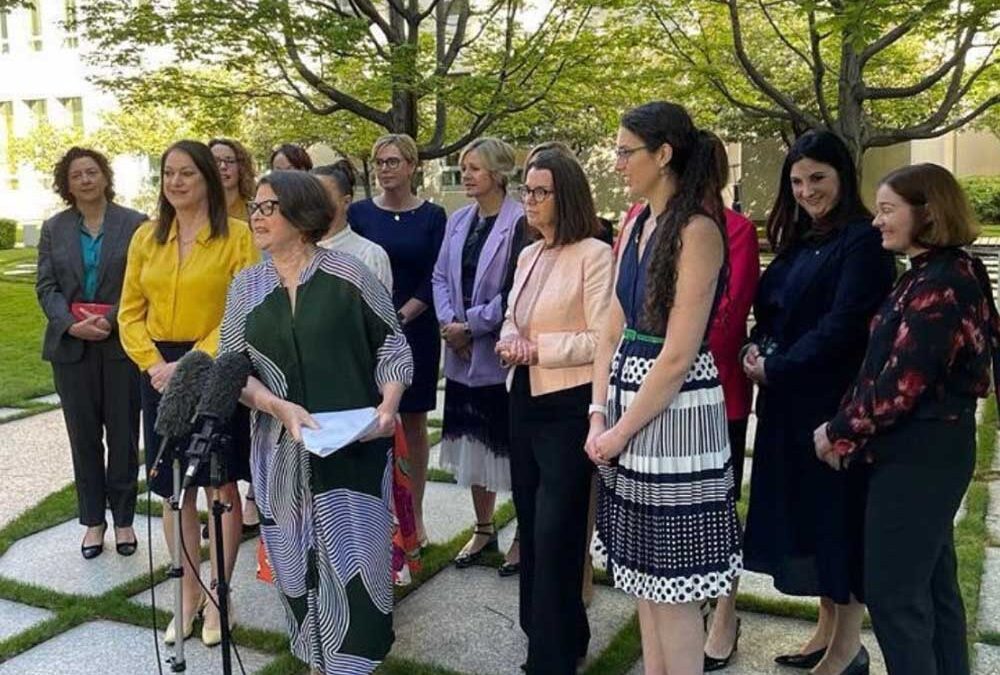ENDOMETRIOSIS AUSTRALIA BOARD DIRECTOR MAREE DAVENPORT joined ASSISTANT MINISTER FOR HEALTH AND AGED CARE GED KEARNEY MP at Parliament House, Canberra, to welcome the $16.4 million Federal Government investment which will establish targeted Endometriosis and Pelvic Pain GP Clinics to improve women’s access to specialised and timely support in primary healthcare settings.
Minister Kearney acknowledged the work of Endometriosis Australia, and its Chair, former MP for Canberra Gai Brodtmann, for its strong and tireless advocacy.
Ms Davenport, whose daughter has suffered with ‘endo and adeno’ since the age of 10, thanked the Minister for her personal commitment to endometriosis and acknowledged the extension of invitations to other female MPs, emphasising the bipartisan and non-political nature of the public policy response to this life defining disease, which affects 11.4% and over 830,000 Australian women. “I also acknowledge the Founder of Endometriosis Australia Donna Ciccia for her unrelenting mission to raise awareness of the needs of ‘endo warriors’ through her own challenges with the disease.” she said.
Canberra resident and Endometriosis Australia volunteer Caitlin Tough, who has suffered endometriosis and adenomyosis since she was 11 years of age, shared her struggle with the disease, the difficulty finding a diagnosis and treatment, and welcomed the MRI subsidies to assist with diagnosis of the disease and fertility challenges. “Specialised Pelvic Pain clinics within General Practice surgeries will help girls and women to access the advice and support they need when they need it.” she said.
- Throughout November the Government, with the support of Primary Health Networks, will identify General Practices with strong experience in managing women’s health,endometriosis and pain management to become specialised clinics. The Federal
Government has committed to funding at least one clinic in each state and territory, with a minimum of 16 clinics to be supported. - As part of broader measures to support women’s health and management of endometriosis, $25.5 million has been committed to add a new pelvic MRI scan to the Medicare Benefits Scheme. This is the first MRI scan listed on the MBS to investigate
conditions that affect fertility. It will offer help and hope for more than 16,000 women a year who are having difficulty conceiving, and for women with severe endometriosis and other conditions that affect fertility.
Endometriosis is classed as a gynaecological disease, but lesions can be found anywhere in the body, from in and around the pelvic region such as the bladder, bowel and ovaries or it can be found as far away as the lungs, skin and brain. Endometriosis can occur in people as young as eight and be present throughout your reproductive life and for some even beyond menopause. This debilitating disease has no known cause, no prevention and no cure and is as common as diabetes. It affects one in every nine girls, women and those assigned female at birth. This life defining disease impacts all aspects of their lives – with pain, heavy menstrual bleeding, often every week, sometimes every day. Infertility is common. It impacts their intimate relationships, their work, participation in sport, causes fatigue and challenges mental health. One third of those with endometriosis will trouble falling pregnant and may require additional support from fertility specialists to start or expand their family.
Endometriosis Australia’s mission is to:
• promote awareness of symptoms and where to get help with diagnosis and the relevant treatment. It takes on average 6.5 years for those living with endometriosis to be diagnosed
• support and fund research into the diagnosis, treatment and ultimate cure for this disease, which affects 11.4% of girls and women, one in nine, around 830,000 Australian ‘Endo warriors’
• pursue advocacy with government to alleviate the $30,000 per endometriosis patient per year in lost productivity and direct health care costs identified through Endometriosis Australia funded academic/scholarly research
• produce resources and information to support sufferers and clinicians, based on empirical evidence, which is trustworthy and verifiable, reliable and relevant
• raise awareness of the impact of endometriosis patients in the workplace, the needs of sufferers at work, with pelvic pain painful and/or heavy periods, extreme fatigue frequent if not constant symptoms challenging the employee, manager or owner of the business or government enterprise. Endometriosis does not discriminate based on seniority, experience or age, with symptoms continuing after menopause. Endometriosis Australia supports girls and women and those assigned female at birth, through:
• Awareness, including in Culturally and Linguistically Diverse Communities
• Pain and symptom management
• Access to empirical evidence and up to date, best practice advice.
Endometriosis Australia works with:
• Clinicians, GPs, hospitals, and medical research institutions and supports research into the treatment of the disease as well as managing symptoms in the workplace.
Thank you to MPs and Senators: Ged Kearney, Anne Ruston, Libby Coker, Larissa Waters, Susan Templeman, Zali Steggall, Lisa Chesters, Sophie Scamps, Monique Ryan, Sally Sitou and Alicia Payne.

